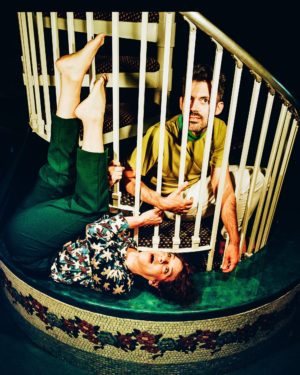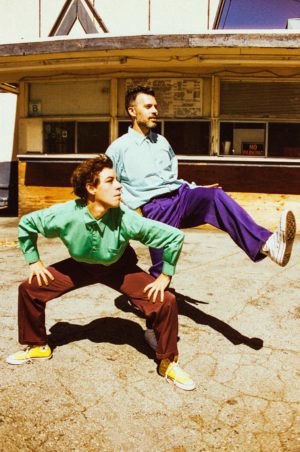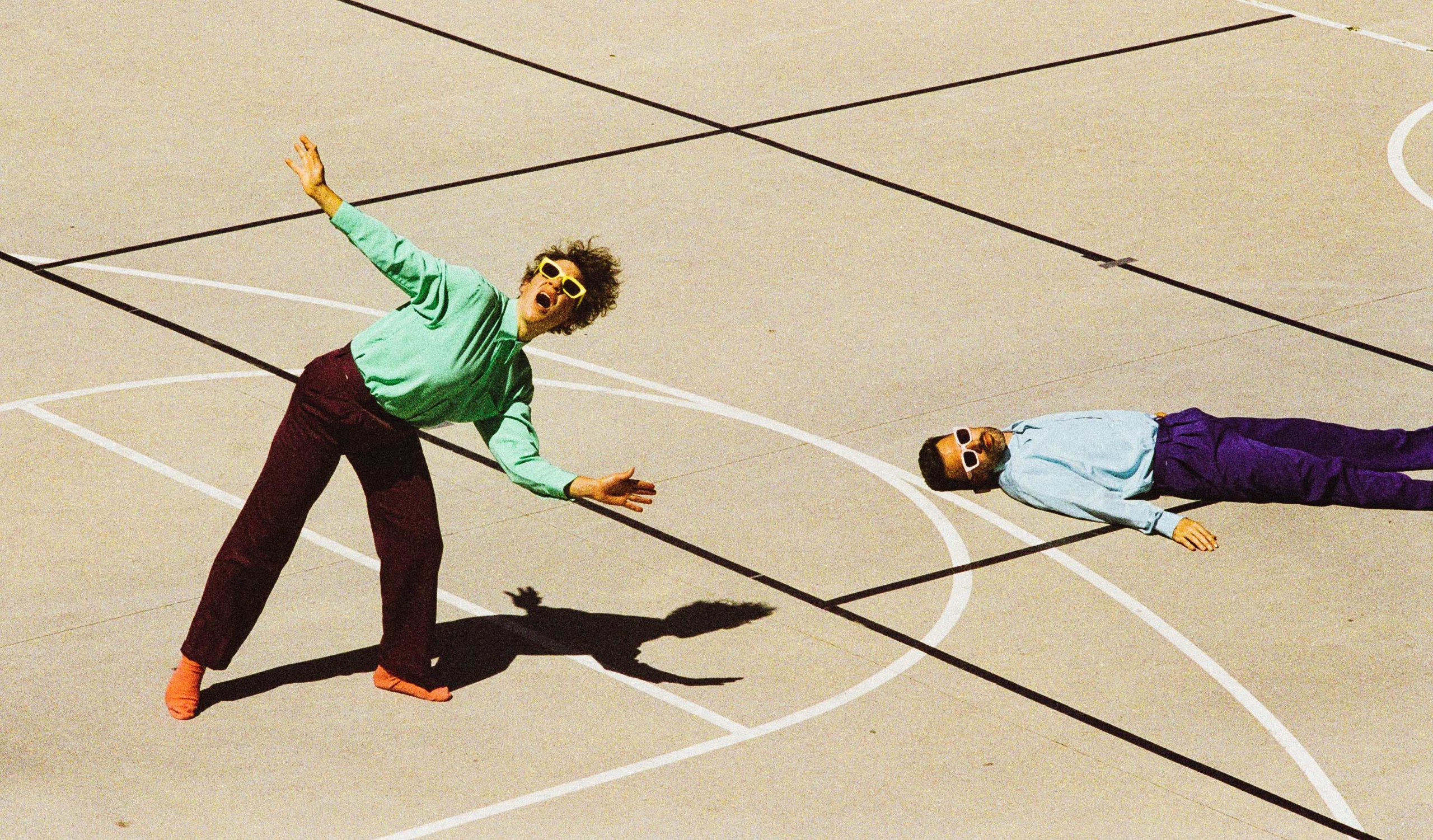Tune-Yards’ Merrill Garbus seems almost preternaturally averse to comfort and complacency. From the kaleidoscopic cyclone of their music to Garbus’ studied approach to songwriting, Tune-Yards—which also includes bassist Nate Brenner—are a band who never sit still for long, probing for the next spark of inspiration and delving into any corner of the psyche it demands. “I think a lot of the process is just searching for what is trying to come out,” Garbus tells me during our recent phone conversation ahead of the release of their new album, sketchy.
This process is one they seem to be mastering more and more as time progresses. Afterall, early next month will mark the tenth anniversary of Tune-Yards’ critically-lauded second record w h o k i l l, an instantly iconic collection of art pop, R&B, and non-Western sounds that firmly established Garbus as a vanguard of a kind of genre-less indie future. It’s the kind of anniversary that sneaks up on you not because they’re a band forgotten to time, but because they’ve never really been of a time to begin with. The interim years have seen Tune-Yards continue to surprise, releasing several equally adventurous albums and a score for Boots Riley’s acclaimed 2018 film Sorry to Bother You, as well as stepping in for a few guest spots on Quelle Chris & Chris Keys’ 2020 LP Innocent Country 2.
sketchy. finds the band up to many of their singular tricks, sculpting a vortex of off-kilter rhythms tasked with containing Garbus’ effervescent vocals—but there’s something decidedly self-assured about their latest output. Garbus has always played the role of bubbling, crackling subconscious of white America, but there’s a confidence here, a naked honesty that’s never quite reached the surface before. Tune-Yards are, by their nature, difficult to pin down, and sketchy. marks another milestone in a career-spanning effort to push any and all boundaries.
Can you walk us through the timeline of the writing and recording process and how the album came together?
It was all written pre-pandemic, so mostly 2019. This is the first album of ours since the first Tune-Yards album that we recorded all on our own. Over the years we’ve always invested in different equipment and knowledge, but for this one we recorded it all by ourselves in our studio in downtown Oakland. Part of our writing process is kind of recording and writing at the same time, essentially, so there was a while there where I didn’t believe we could make a record on our own, which came from a lack of confidence in my recording skills. But at a certain point, a few months in, I realized I really liked the sound we had, and it was exactly what I wanted. At first there was this idea where maybe we could record and write it on our own and then go re-record it elsewhere, but pretty quickly that felt like a wasteful idea, and what was happening in our studio was what we wanted.
You mentioned how the writing and recording were very connected and I read that much of this album was born out of extended jam sessions—is this how Tune-Yards’ music typically gets written?
It’s been different across the span of the history of the band. w h o k i l l was really written on the road because we were touring behind BiRd-BrAiNs all the time, and we would try things during extended soundchecks, or try new things on stage. Songs like “Gangsta” and “Bizness” were really written in front of audiences, which is, in retrospect, kind of unheard of. The records after that were very studio-based, but I always try to have some kind of live element in there. For instance, on the last record I was playing with drum machines and would play shows under a pseudonym and use these drum machines in a live context. But mostly we write on the computer, and for this record it felt like we needed to get our hands on instruments and let that be what propelled us.
“We just tried to do as many creative things with each other that didn’t involve sitting in front of a computer, because for us there is always plenty of that. We wanted the seeds of the songs to be born out of playing live.”
In the spring of 2019, Nate and I got into a disciplined habit of getting in the studio Monday through Friday at least, and either I would play drums or he would play bass or vice-versa. We would roll a twelve-sided die and let that choose tempo, time-signature, etc. We just tried to do as many creative things with each other that didn’t involve sitting in front of a computer, because for us there is always plenty of that. We wanted the seeds of the songs to be born out of playing live.
It sounds like you established a lot of freedom to create within the studio and during the writing process—does this kind of looseness ever get scary?
Maybe “scary” is a strong word, but it definitely feels murky and confused until it doesn’t anymore. For me, there’s the jamming in the studio, but equally as important was my walk to the YMCA, the conversations I was having, and the thinking I was doing. On top of that, trying to do my morning pages, as I call them, and making sure my pen is hitting the paper everyday so the lyrical ideas are coming out. That’s all to say that the writing process always feels very roundabout and a bit risky. I always think about how I could just stop in the middle of the day and do the dishes or vacuum rather than finish the record. It’s tough to remember that anyone cares when you’re writing down what feel like idiotic words in a journal somewhere.

Around the release of I can feel you creep into my private life, you talked a lot about the idea of learning about how little you really know. How has that continued to form the way you think and write?
When I think about it, a lot of Tune-Yards has been an exercise in writing music that asks questions. I’ve never been particularly interested in telling a specific story the way I see it. I’ve always been suspicious of my personal story and more interested in asking questions. I guess the question is whether I can write songs about things that are potentially really hurtful and harmful, and also, frankly, questions that a lot of people aren’t going to want to ask themselves. I think on the last record I realized a lot of people didn’t want to listen to music that was an inquiry into whiteness. But, you know, oh well, because that’s what I needed to ask myself about. All I can hope is there are other people out there who really want to explore these types of questions as well. What music is so good at is you can have texture, timbre, harmony, or dissonance in the music offsetting lyrical ideas. Music can do this beautiful thing where you can have a conversation within a piece of art in a nuanced way that literal conversation doesn’t allow.
“I don’t really find comfort in my point of view. The more I learn about my point of view, the more scared I get about it. In other words, the more I uncover my limited perspective and how attached I am to my comforts and my safety, the less comfortable I am.”
As someone who’s clearly very thoughtful about the ideas you want to express within your music, how critical are you of lyrics as you are writing? Does it take a while to get to a place of comfort with the point of view you’re expressing?
I am very critical and, honestly, I don’t really find comfort in my point of view. The more I learn about my point of view, the more scared I get about it. In other words, the more I uncover my limited perspective and how attached I am to my comforts and my safety, the less comfortable I am. A lot of the songs on the last record in particular—but on this record too—can really be nauseating to sing. I am finding, now that we are rehearsing, I sometimes will forget words intentionally—like I actually can’t get through the lyrics to “homewrecker” for instance, because I don’t want to say those words. There is definitely a huge part of my psyche that doesn’t want me to admit that in front of people or put those words in my mouth. It’s this reach for innocence. Like, don’t sing those lyrics, you’re not to blame for that. I guess that’s the joy of putting out a record—it’s out there, it’s in print, I can’t take it back.
You mentioned it a bit earlier, but how has the way you engage with the critical reception of your work changed over the years?
I definitely care less about what other people think. That has both to do with being in my forties and the fact that the ground we stand on financially and career-wise feels a little more solid. The longer we survive as a band—which is no small thing in the life of indie bands—the more confident I am that we make music people really want to listen to. Also, I really believe, frankly, we are getting better at what we do. I think I am a better producer, we’ve gained a ton of technical and creative skills by working on film scoring, we’ve produced other people’s records and done a thousand remixes for other artists, so we’re constantly honing our skills. The last record made me realize I really can’t let someone tell me what my work in the world is. There’s also some acceptance—like, of course not everyone in the world is going to like this. After w h o k i l l, I stopped reading reviews because it set me on the wrong path of getting really in my head and self-loathing more than I was already self-loathing.
Did you find there were any moments where you were moving further out of your comfort zone than on previous records?
A couple moments definitely stick out. The song “hold yourself” is way more plainly spoken than I typically am in my lyrics. It felt really sincere and truly, for months and months, I was kind of sickened by that song. It just feels like the lyrics are way more transparent than I often am. I usually like to think of lyrics like a confusing puzzle of poetry, and I had to really allow myself to write more straightforward lyrics. It’s funny because it doesn’t sound as risky when I say it that way, but for me, putting it all out there in plain terms is really risky. Especially topics like not having children or feeling betrayed by our parents’ generation—those are things that are hard to take back. That stuff feels pretty personal to have out there, but I’m glad that it’s out there and it feels like a song that people have been responding to, so maybe other people needed to hear that too. FL








